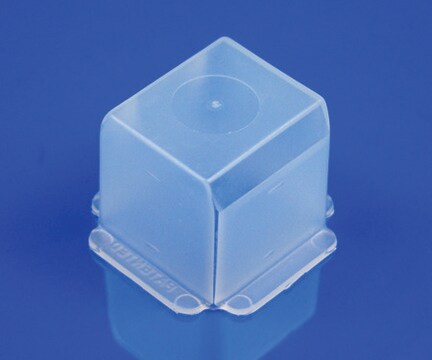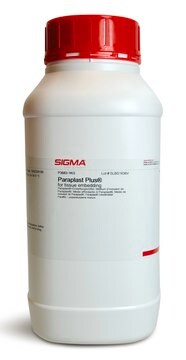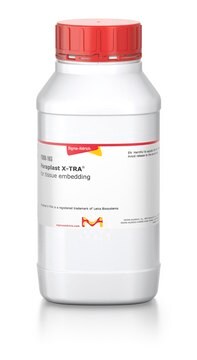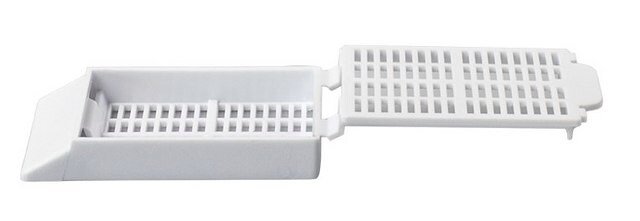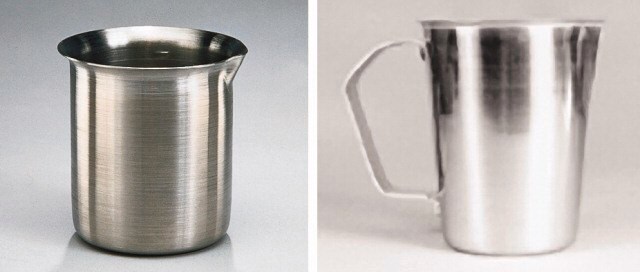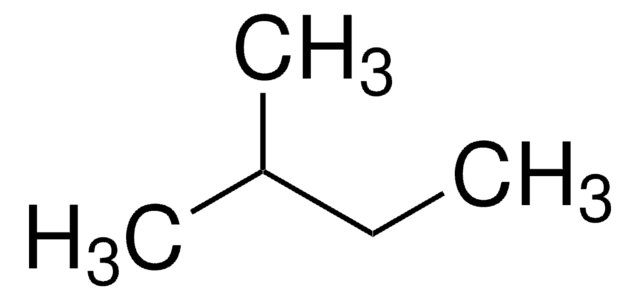P0091
PolyFreeze
water-soluble support matrix
Synonym(s):
water-soluble support matrix for frozen sectioning
Sign Into View Organizational & Contract Pricing
All Photos(1)
About This Item
UNSPSC Code:
12171500
NACRES:
NA.47
Recommended Products
Quality Level
color
colorless
density
1.030 g/cm3
application(s)
hematology
histology
storage temp.
room temp
General description
PolyFreeze is a water-soluble support matrix and a form of embedding medium for frozen sectioning. PolyFreeze sections flawlessly at routine frozen specimen thickness of 5-6 μ and leaves no slide residue. It provides for -20 ºC cryostat sectioning in rapid set embedment. This medium freezes quickly supporting the tissue for sectioning at 3 mm and up with no cracking of the matrix at temperatures from -8 °C to -25 °C. Snap freeze using PolyFreeze with isopentane and liquid nitrogen, or dry ice (slush/slurry or bunker). Store specimens frozen in PolyFreeze in liquid nitrogen canisters or in airtight containers in a -80 °C freezer. PolyFreeze does not cause autofluorescence and can easily be washed away during fixation and rinsed prior to staining. Once rinsed, there is no trace of the support matrix to interfere with staining or immunohistochemistry (IHC) reactions.
Application
PolyFreeze has been used as an embedding medium for frozen sectioning of plant and animal samples.
Preparation Note
PolyFreeze is supplied ready-to-use. A cloudy appearance of the unfrozen product has no effect on its performance.
Storage and Stability
Store the product at room temperature
Storage Class Code
10 - Combustible liquids
WGK
WGK 1
Flash Point(F)
Not applicable
Flash Point(C)
Not applicable
Personal Protective Equipment
dust mask type N95 (US), Eyeshields, Gloves
Certificates of Analysis (COA)
Search for Certificates of Analysis (COA) by entering the products Lot/Batch Number. Lot and Batch Numbers can be found on a product’s label following the words ‘Lot’ or ‘Batch’.
Already Own This Product?
Find documentation for the products that you have recently purchased in the Document Library.
Customers Also Viewed
Application of Endophytic Pseudomonas fluorescens and a Bacterial Consortium to Brassica napus Can Increase Plant Height and Biomass under Greenhouse and Field Conditions.
Lally R D, et al.
Frontiers in Plant Science, 8, 2193-2193 (2017)
Identification of a Potential Common Ancestor for Mammalian Cross-Presenting Dendritic Cells in Teleost Respiratory Surfaces.
Soleto I, et al.
Frontiers in Immunology, 9, 59-59 (2018)
Gamze Turgay-İzzetoğlu et al.
Acta histochemica, 121(4), 460-471 (2019-04-14)
The fat body, originates from mesoderm, has many metabolic functions which changes as the embryonic development of the insect progresses. It plays an important role in the intermediate metabolism and in the metabolism of proteins, lipids and carbohydrates. It has
S Yalcin et al.
British poultry science, 60(3), 195-201 (2018-01-23)
1. The objective of this study was to determine muscle structure and gene expression in pectoralis major (p. major) muscle of broilers in response to deep pectoral myopathy (DPM) induction. 2. A total of 160 chickens from slow- and fast-growing
Davide Schiroli et al.
Molecular therapy. Nucleic acids, 17, 891-906 (2019-09-03)
Autosomal dominantly inherited genetic disorders such as corneal dystrophies are amenable to allele-specific gene silencing with small interfering RNA (siRNA). siRNA delivered to the cornea by injection, although effective, is not suitable for a frequent long-term treatment regimen, whereas topical
Our team of scientists has experience in all areas of research including Life Science, Material Science, Chemical Synthesis, Chromatography, Analytical and many others.
Contact Technical Service

